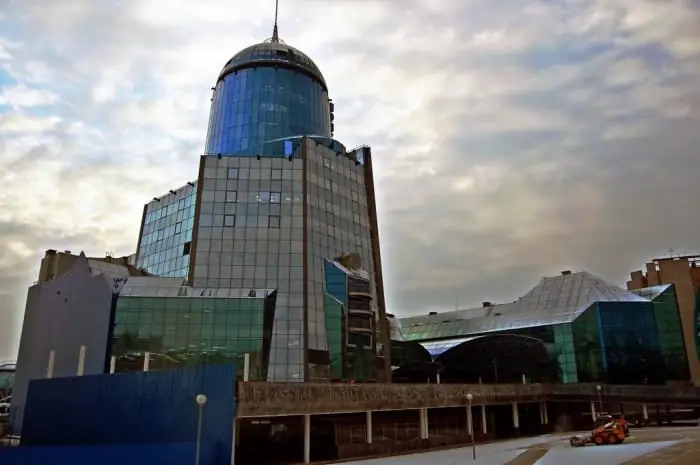- Author Harold Hamphrey hamphrey@travelwaiting.com.
- Public 2023-12-17 10:06.
- Last modified 2025-01-24 11:10.
Teatralnaya metro station is located on the Zamoskvoretskaya line. It got its name from the square nearby. This station has acquired the status of an object of cultural heritage and is the latest project of the architect Ivan Fomin. The article tells about the objects located near the Teatralnaya metro station. We are also talking about the history of the founding of this station.

Construction
In the 20s of the last century, the square, which is located near the exit from the Teatralnaya metro station, had a name different from the modern one. Like other objects in Moscow and other cities of the country, it bore the name of one of the statesmen. It was under Sverdlov Square that in 1927, according to the draft, it was supposed to start building a new station. However, this plan was not implemented then. Construction began in 1936. Teatralnaya metro station opened 2 years later.
History
During the Second World War, the station was also called "Sverdlov Square". In those years, the Teatralnaya metro station servedbomb shelter. In the mid 70s. the Central Interchange Hub underwent reconstruction. The result is two transitions. The first led to the station "Revolution Square", and the second - to the "Okhotny Ryad". From the metro station "Teatralnaya" and today you can go to the Sokolnicheskaya or Arbatsko-Pokrovskaya lines.
In 1990, the original name of Theater Square was returned. The metro station has also been renamed. However, traces of the letters that made up the old name have survived to this day.

Architectural features
Metro "Teatralnaya" is a deep station (35 m). The design is three-leaved, pylon. When creating the plan, Ivan Fomin used technologies that he first applied when designing the Krasnye Vorota station. Although the Teatralnaya metro station originally had a different name, in the design it focused on the theatrical theme.
The interior of the station is similar to the temple of Melpomene, reminding residents and tourists of the architectural and historical monuments located on the surface. The vaults of the central hall are decorated with diamond-shaped caissons. Their lower row is decorated with decorative porcelain inserts. All this is sustained in the theatrical style of the peoples of the USSR.
The figures that can be seen on the vault of the central hall are about a meter high. Each of them depicts a character in a national costume, dancing or playing a musical instrument. When the project was created, the USSR included only 11 republics. Here are 7 of them. The figurines were created according to the sketches of the sculptor-ceramist Natalya Danko at the Leningrad Porcelain Factory.
The design of the station is dominated by light colors. Crystal lamps in a bronze frame are suspended from the vaults. Above the benches and in the niches there are sconces with spherical shades. In the central hall, the floor is lined with black gabbro tiles.
Teatralnaya metro station in Moscow is one of the historical sights. Located in the very center of the capital. One of the vestibules is built into a former apartment building and is located on Bolshaya Dmitrovka Street. From the Teatralnaya metro station, the exit to the city from the southern part leads to Revolution Square, and from the northern one to Theater Square.
It is worth saying a few words about the objects that are in the vicinity of this station.

Cultural and historical monuments
There are many attractions in the vicinity of the station. This includes the Bolshoi Theatre, the Maly Theatre, and the Chekhov Moscow Art Theatre. If you leave the station towards Theater Square, you can get to the Central Department Store in just a few minutes. From here it is not far to Red Square, the State Historical Museum and the Metropol Hotel.
Theatre Square
Several centuries ago, the Petrovsky Theater was located here. It was named after one of the streets of Moscow. Thus, for some time the square was called Petrovskaya.
Today, the area in which the Teatralnaya metro station is located is one of the most comfortable and picturesque in Moscow. But a few centuries ago this area lookeda little differently. The situation was aggravated by fires, the worst of which occurred in 1812.
The project of the future square was created at the beginning of the 19th century. According to the plan, it was supposed to have the shape of a rectangle, and along the perimeter it should be limited to symmetrically standing buildings. It is noteworthy that most of the Theater Square was inaccessible to the townspeople until 1911. A parade parade was placed here, fenced with ropes.

Bolshoi Theater
The history of this cultural and historical monument began at the end of the 18th century. Initially, it was a small theater that had imperial status. From time to time, he passed into submission either to the Governor-General or to the St. Petersburg Directorate. In 1917, all property, as you know, was nationalized. The complete separation of the Bolshoi and Maly theaters happened just then. The area where the station, which is described in this article, is located, has been the focus of the theatrical life of the capital for many years.






